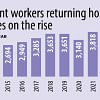Migrant workers stare into uncertainty as global crises deepen
Bangladesh witnessed a record outflow of migrant workers last year due to the reopening of the Malaysian market and expansion of the Saudi market, but it may not be sustainable unless a number of factors are addressed.
And the recent escalation of tensions in the Middle East due to the Iran-Israel confrontation has raised grave concerns.
Last week, Iran launched hundreds of drones as well as cruise missiles towards Israel in response to a strike on an Iranian diplomatic building in the Syrian capital, Damascus, on April 1. In response, Israel carried out a strike on the Iranian city of Isfahan on Friday.
Moreover, further setbacks are posed by Malaysia's decision to freeze new foreign worker recruitment in March as well as Oman suspending the issuance of visas to Bangladeshi citizens at the end of 2023 due to an oversupply of workers from the South Asian nation.
In the first three months of this year, 2.36 lakh migrants left Bangladesh, with 26,850 going to Malaysia and 302 to Oman, as per data of the Bureau of Manpower Employment and Training (BMET).
Bangladesh is already contending with the fallout from the ongoing Red Sea crisis, the conflict in Gaza, and the Russia-Ukraine War.
Rising tensions in the Middle East are a big problem for Bangladesh because the region is home to a majority of migrant workers from the country. Major destinations include Saudi Arabia, the United Arab Emirates, Oman, Jordan, Qatar, Kuwait, and Lebanon.
In 2023, around 13.05 lakh migrants left Bangladesh, with Saudi Arabia alone welcoming 4.97 lakh, or 38 percent, according to BMET data.
Malaysia, which reopened its labour market in 2022 after a four-year hiatus, emerged as the second-largest employer with 3.51 lakh Bangladeshis recruited.
Oman hired 1.27 lakh workers from Bangladesh in 2023.
"There will be huge losses for Bangladesh if the Iran-Israel crisis spreads," said Ali Haider Chowdhury, general secretary of the Bangladesh Association of International Recruiting Agencies (Baira).
"Not only that, if any crisis hits a Muslim-majority nation, it will definitely hurt Bangladesh economically by reducing remittances."
Chowdhury termed Oman and Malaysia's decisions to freeze on new foreign worker recruitment as "concerning".
"We expect this Iran-Israel crisis will not expand anymore. But still, we have to depend on the Middle Eastern market, including Saudi Arabia," said Chowdhury, also director of East West Human Resource Center Limited.
Syeda Rozana Rashid, a professor of international relations at the University of Dhaka, expressed deep concerns, saying: "2024 may witness the reverse of the situation that we saw last year."
The escalation of tensions in the Middle East coupled with Malaysia and Oman's recruitment restrictions will have major impacts on Bangladesh, she said.
"The migration cost will rise and remittances may fall in the coming days."
Remittance receipts stood at $21.94 billion in 2023, up 3.1 percent year-on-year, BMET data showed.
If the crisis spreads, migrant workers will have to choose alternative routes, thereby incurring higher costs. This may lead more people to try and enter a country through illegal channels.
On top of that, many recruiters may cut the number of workers they hire due to economic or security issues.
"Ultimately, such issues will hit remittance inflows," Prof Rashid said, suggesting the government explore fresh destinations for migrants.
Echoing those sentiments, Baira Secretary Chowdhury said: "There is no alternative but to focus on new markets."
He said Qatar Emir Sheikh Tamim bin Hamad Al Thani is coming to visit Bangladesh this week. "The government should request him so that our labour market expands in the country."
Last year, Qatar hired 56,148 people from Bangladesh.
There is also the possibility of sending more migrants to South Korea, Thailand, Russia and European countries like Romania and Poland.
Chowdhury also urged the government to take steps to open visa centres or consulate services in Bangladesh of the nations that do not have diplomatic missions in the country.
In the absence of such diplomatic missions, many have to travel to India to apply for visas. However, getting an Indian visa is not an easy task for many of them in the first place, he said.
According to the International Monetary Fund's Global Economic Outlook for April, the conflict in Gaza remains a key downside risk for the Middle East and North Africa region, including a risk of further escalation or a protracted conflict.
"The conflict not only causes lasting human and social costs but can also lead to large and persistent output losses with potential spillovers to other countries."

 For all latest news, follow The Daily Star's Google News channel.
For all latest news, follow The Daily Star's Google News channel. 









Comments